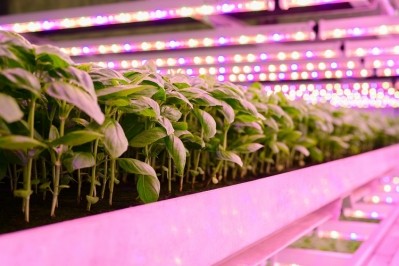Former FDA Frank Yiannas to bring multidimensional risk assessment to Revol Greens as safety advisor

With Yiannas' experience in designing and implementing food safety initiatives like FDA’s Fresh Leafy Greens Action Plan, Final Food Traceability Rule, Proposed Agricultural Water Standard and the New Era of Smart Food Safety, along with leadership roles at Walmart and the Walt Disney Company, he will “advise Revol Greens on how to best design food safety into existing and future production facilities, engage in smart, fit-for-purpose agriculture policy and establish a high standard of care for the Controlled Environment Agriculture (CEA) industry to follow,” the company stated.
Yiannas’ advisory appointment follows the recent opening of Revol Greens’ Temple, Texas facility and the hiring of CFO, James Bradley, reflecting the company’s goals to reach higher greenhouse yields and improve margins.
“Leaving FDA about six months ago,” he said, “I've been very selective and intentional on what I would like to do next. I [want] to work on ideas that I think are critical for the future of food…to work with people and brands that I think are innovative, and to put the consumer first.”
“Multi-dimensional risk assessments”
As advisor, he plans to strengthen Revol Greens’ safety practices by advising on thorough risk assessments to evaluate potential hazards, food safety concerns (biological, chemical or physical), as well as production processes from packaging and shipping to the final destination and “see where the opportunities are for hazards and risks…and then how [to] control them.”
”Anything that's an input into the production of this product, whether it's the seeds themselves, to any food contact surfaces during the production and germination, the water—[which] will always have human handling—and packaging and refrigerated cold supply chain distribution to stores, we will be looking at every point in the production with a great amount of detail and doing what I would describe very robust multi-dimensional risk assessments and wherever we think there's a hazard or risk, we will…look at better ways to control those risks,” he emphasized.
He added, “[Food producers] are still seeing pressures, ranging from continued supply chain challenges, whether it's ingredients, packaging or products themselves. We all know about the labor shortages that are occurring.”
Yiannas will also implement safety improvements on Revol Greens’ existing and future facilities and equipment, as well as engaging agricultural policy that is “smart and fit for purpose for this emerging field of CEA.”
[Editor's note: Interested in learning more about the challenges and opportunities facing indoor farms? Join FoodNavigator-USA at our Futureproofing the Food System virtual summit this November where we talk about indoor farming's moment of truth. We will also explore other food tech, the food as medicine movement and the circular economy. Check out the agenda and register HERE.]
'You can't just influence human behavior with written policies alone'
Yiannas cited the economic, environmental and policy pressures that food producers face, particularly since the pandemic, as fundamental factors that will inform his recommendations.
Addressing these pressures, he explained, requires a strategy to influence safety culture internally, while adhering to policies.
“If you want to affect the safety and quality of product that is being produced, you're having to influence the behaviors of people that are working in those establishments, even if you design it into the processes themselves. And so, at the end of the day, food safety is largely behavior, and you can't just influence human behavior with written policies alone.”
“When I worked at FDA, you could write the best laws in the world. But if you can't get people to do them, they're useless,” he added.
With over one hundred million servings of fresh leafy greens consumed “safely every day,” Yiannas added that while outdoor agriculture’s output and innovations are “impressive,” outbreaks linked to produce in these “complex agricultural ecosystems are often beyond a farmers’ control,” citing the role of how CEA allows “a grower or operator to have much greater control over these wide variety of variables (i.e. temperature, water control, inclement weather, presence of livestock, etc.) that could affect the safety and quality of the product.”
“We’re taking a complete seed to table approach to food safety making sure that any sources or inputs that will somehow be involved with the production or product be as safe as can be. This is this idea of a shared responsibility for food safety,” he added.





















